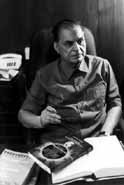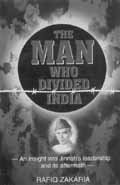
Blame it on Jinnah!
 DOM MORAES meets and interviews DR. RAFIQ ZAKARIA, the eminent Islamic scholar, whose new book The Man Who Divided India deserves to be read by one and all.
DOM MORAES meets and interviews DR. RAFIQ ZAKARIA, the eminent Islamic scholar, whose new book The Man Who Divided India deserves to be read by one and all.
OFF Cuffe Parade, in a large flat that also contains his library and his office, Dr. Rafiq Zakaria contemplates the world and writes his books. He is one of the most eminent Islamic scholars left in India, and the most reliable spokesman for the Muslim community. He is also a fervent defender of the rights of Indian Muslims, and a renowned educationist. He has set up a number of schools and colleges for the young of the community, including girls, in Mumbai and other parts of western India. But at 81, he is as restless as an eagle disturbed in its eyrie. What most disturbs him is the present state of Indian Muslims. There are 140 million of them, and they are predominantly passive and sad, afraid to speak.
He attributes their troubles, and those of the other Muslims in the subcontinent, primarily to one person, whose life he describes in his latest book, The Man Who Divided India, (Popular Prakashan, Rs. 350). The man who divided India also founded Pakistan. There his name is remembered, though it has been almost completely forgotten on this side of the division lines. He was Mohammed Ali Jinnah, known as the Quaid-e-Azam. As Dr. Zakaria points out, it is ironic that Pakistan should have been founded by someone who was wholly western in his habits, knew very little about Islam, drank whisky every night of his life, and ate pork sausages with relish, as the anecdotes in this book illustrate.
But he is very bitter about Jinnah. "He died in 1948," he remarked. "Had the Congress leaders, Nehru and Patel, stood fast for a few months, the whole process of partition could have been avoided, and India would still be intact. The only man who wanted it was Jinnah. The British also wanted to finish the deal as quickly as possible so that they could get out of India. The Viceroy, Mountbatten, pushed Nehru and Patel to make up their minds quickly. Nehru wavered and hesitated instead of taking a firm stand. Even Patel, it is said, succumbed to a false argument. He was told that if India remained undivided there would be trouble from the Muslims. But at least it would have remained a domestic issue.
 "It could have been resolved internally, by political means. What happened instead was that by allowing partition, Nehru and Patel created a hostile nation on their doorstep. The hostility came after partition, first with the killings that took place at the time." Slowly and bitterly, Dr. Zakaria said, "A million people were killed at the time of partition. Hundreds of thousands of women were raped and kidnapped. Children were not spared. Both sides suffered equally. This created hatreds that could not be forgiven nor forgotten. And then came Kashmir. A Hindu ruler with a predominantly Muslim state opted for India. The Kashmir problem still remains the biggest obstacle to peace between the two nations." Dr. Zakaria has had a very full and active life. He has not only been a lawyer, educationist, and author. He has also been a journalist, a politician, even a diplomat who represented India at the United Nations. It is a frightening number of professions for one man to have followed. Anyone who has done all this would by necessity have to have a highly organised personal life. Today, silent servants efficiently served tea, cake, and biscuits on request. Whenever Dr. Zakaria pressed a bellpush, a genie in contemporary attire emerged from the shadows to produce photographs and books, xerox documents, and find files. Begum Zakaria has been a working woman all her life, and is well known as a journalist; but one saw her hand invisibly direct all these small details of her husband's life. Their son is a highly placed and senior editor with Newsweek in America.
"It could have been resolved internally, by political means. What happened instead was that by allowing partition, Nehru and Patel created a hostile nation on their doorstep. The hostility came after partition, first with the killings that took place at the time." Slowly and bitterly, Dr. Zakaria said, "A million people were killed at the time of partition. Hundreds of thousands of women were raped and kidnapped. Children were not spared. Both sides suffered equally. This created hatreds that could not be forgiven nor forgotten. And then came Kashmir. A Hindu ruler with a predominantly Muslim state opted for India. The Kashmir problem still remains the biggest obstacle to peace between the two nations." Dr. Zakaria has had a very full and active life. He has not only been a lawyer, educationist, and author. He has also been a journalist, a politician, even a diplomat who represented India at the United Nations. It is a frightening number of professions for one man to have followed. Anyone who has done all this would by necessity have to have a highly organised personal life. Today, silent servants efficiently served tea, cake, and biscuits on request. Whenever Dr. Zakaria pressed a bellpush, a genie in contemporary attire emerged from the shadows to produce photographs and books, xerox documents, and find files. Begum Zakaria has been a working woman all her life, and is well known as a journalist; but one saw her hand invisibly direct all these small details of her husband's life. Their son is a highly placed and senior editor with Newsweek in America.
It is a very successful family and has been, at least through Dr. Zakaria, of service to the nation. There are others like it in India today, but the point is that hardly any of them are now Muslim. When the country was undivided, several such families were. I recall them from childhood as friends of my father's. This, as Dr. Zakaria says, is due to Jinnah. "Now 140,000 million Muslims are under Hindu domination. If Pakistan ever takes over Kashmir, their lives in this country will be in jeopardy. As for the Muslims in Pakistan, they live under military dictatorship and their aspirations are smothered. India has some benevolent influence in Bangladesh, but where now in the subcontinent do Muslims have any chance?"
It seems now to be his mission to restore the chances of Indian Muslims. "Because of the change in attitudes since the Ayodhya incident, Muslims here are not even considered Indians. I spoke to Mr. Advani on the phone today to wish him happy Diwali." He smiled ironically. "I'm glad that because of all the work I have done, the BJP considers me to be an Indian. Some extremists after September 11th, consider the Muslims to be a threat. How are they a threat? They are mostly poor, illiterate, and scattered all over India, often in villages. Most of them have never heard of Osama bin Laden. They are afraid of the Hindus. If only the BJP government offered them even a little help, they could be rescued from this situation, into which they only fell because India was divided.
"A few of them, in urban areas, may be misguided. They may stand in the streets and shout against the Americans in Afghanistan. This will be seized on by the Hindu extremists as an example of what Muslims are like. This is not the case with the majority. The majority would like to get on with their lives in this country, which is the only one they have or know. They have no options now." Dr. Zakaria looked extremely sad, but also extremely determined. "The government must help them save themselves from illiteracy and poverty. Otherwise the Muslims will replace the Dalits as the lowest and worst treated community in India. I have written my book on Jinnah not only to establish that he was the one responsible for their situation, but to point out what the situation of Muslims on the subcontinent has become as a result of his irresponsible actions."
It is a very fine book, and should be widely read, perhaps more by young Hindus than by anyone else. The travesty of history taught in Indian schools and colleges has led young people to accept many lies as historical truth. The British, even in the 1930s, fully intended to leave India at some future date. The freedom movement was only intended to bring that date forward. Muslims as well as Hindus took part in this movement. The British from time to time attempted to suppress it. But the numbers of people imprisoned, tortured in prison, executed, or killed by police in the course of movements opposed to the government were far fewer during the 89 years of British rule than during the 54 years that India has been independent. Why should young Indians not know these facts? Dr. Zakaria's book doesn't mention this aspect of Indian history, but it does point out that independence and partition, in the end, did not come about by any heroic struggle. They came about through a tripartite horse trade between the Congress on one hand and the British on the other, with a mephistophelian Jinnah whipping them both on to hasten their decisions, and so precipitate disaster. In writing on Jinnah, Dr. Zakaria has also written on the most crucial moment in all Indian history, and, for both, he deserves our congratulations.